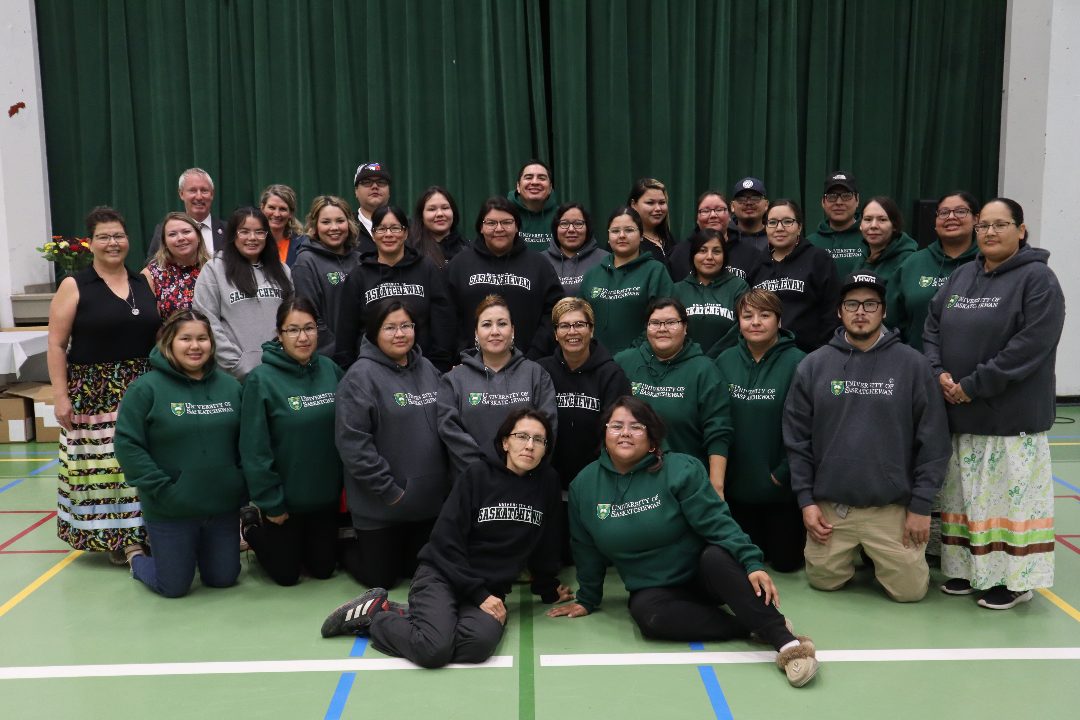
USask to offer Bachelor of Education program in Pelican Narrows
Representatives from the University of Saskatchewan (USask), Northern Lights School Division and Peter Ballantyne Cree Nation (PBCN) Education Authority met in Pelican Narrows Wednesday, Sept. 27 to sign an agreement between their organizations to offer the Bachelor of Education degree program in the northern community.
The agreement supports courses delivered by the College of Education and the College of Arts and Science to pre-service teachers in Pelican Narrows, with satellite locations in Sandy Bay and Deschambault Lake. Named the Cree Teacher Education Program (CTEP), 34 students joined the cohort in September and are working towards a Bachelor of Education (BEd) degree, specializing in Cree and Indigenous Studies.
In 2019, the first CTEP cohort began classes in Cumberland House, Sask. The program reached its conclusion in the spring of 2023 with 26 students receiving their BEd degrees. As a result of the first CTEP cohort, the two schools in the Cumberland House area no longer face staffing shortages.
“After the success of the first CTEP cohort, the College of Education is thrilled to continue offering Indigenous students in northern communities the opportunity for post-secondary education close to home,” said Dean Julia Paulson (PhD). “The college is honoured to work with strong community partners to enhance education in northern Saskatchewan. It’s wonderful to see 34 students sitting before us and we wish them all the best on their learning journey.”
Jason Young, director of education with the Northern Lights School Division, is looking to continue growing the number of teachers in Northern Saskatchewan.
“I am excited that we are gathered here together to celebrate culture, language, identity, and relationships at this beautiful ceremony in this beautiful community with all of these beautiful people,” Young said. “There will be challenges along the way, but I know these students will succeed because they have gone this far and that they will continue to be successful on the journey. I look forward to observing their progress and seeing them at the graduation ceremony.”
Community partnerships are key to running a successful cohort. PBCN Education Authority Incorporated administration and other dignitaries were in attendance, including PBCN Chief Karen Bird, Pelican Narrows Mayor Ovide Michel, and Sandy Bay Mayor Gertrude Bear.
“The desire of our local communities to expand and offer language and cultural programs is also crucial to our First Nations to revitalize Canadian Indigenous languages and cultures,” said PBCN Director of Education Darren Linklater. “Indigenous peoples are significantly underrepresented in the teaching professions. This partnership is a testament to our commitment to serving our communities and our response to the Calls to Action of the Truth and Reconciliation Commission, specifically Calls to Action 62 and 64.”
For the students, the significance of CTEP being offered in Pelican Narrows allows them to access post-secondary education in their home community. Incoming student Amelia Bear noted the importance of being able to balance her studies with her family commitments.
“‘It takes a village to raise a child’ is a saying we hear lots, but it means that an entire community of people must come together to interact positively with children for them to experience and grow in a safe and knowledgeable environment,” said Bear. “CTEP allows us to become the educators that raise and teach our children together for their success ... Together, we will continue to build relationships, understand First Nation worldviews, and make education an important part of our community.”
Article re-posted on .
View original article.

